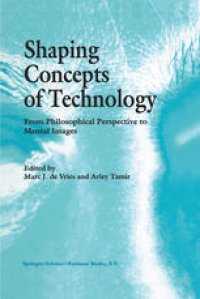
Ebook: Shaping Concepts of Technology: From Philosophical Perspective to Mental Images
- Tags: Professional & Vocational Education, Philosophy of Technology, History, Interdisciplinary Studies
- Year: 1997
- Publisher: Springer Netherlands
- Edition: 1
- Language: English
- pdf
As our modem society is so obviously influenced by technology, there is a growing awareness of its importance for education. The interest for including technology as a part of general education curricula is increasing. In many countries technology is an element in the curriculum either as a topic, a project, part of a Science-Technology-Society (STS) programme, part of science education, or as a separate subject. In order to clarify what technology is, there is a need for international discussions in which philosophers, engineers, scientists and educational ists are involved. One of the few conferences with such a broad representation was the second Jerusalem International Science and Technology Education Conference (JISTEC) that was held in Jerusalem, January 8-11, 1996, a conference that can truly be seen as a milestone in the international history of technology education. More than 1,000 technology educators from more than 80 countries of the world and ministers of education from 28 coun tries came together to discuss current issues in technology education during JlSTEC. To cite from Dr. Michael Dyrenfurth's personal overview of the conference in the Journal of Industrial Teacher Education (vol. 33, no. 2, Winter 1996, pp. 83-85): 'Simply put, this conference represented the most stellar international collection of technology education advocates the world has ever seen in one place'. Or in the words of Dr.
What is the nature of technology? And what is the body of knowledge for technology? Those questions are discussed both in the philosophy of technology and in technology education, but in different ways. Philosophers develop valid concepts of technology and educationalists reflect on the way such concepts can be built up in the minds of pupils and students. Not only the overall concept of technology but also specific concepts within technology are presented both from philosophical and from educational perspectives. This book shows how the philosophy of technology can provide an academic background for the development of technology education. At the same time it helps philosophers to take into account the intuitive ideas people hold in their considerations about the true nature of technology.
The texts are adapted versions of papers that were presented at the second Jerusalem International Science and Technology Education Conference held in 1996.